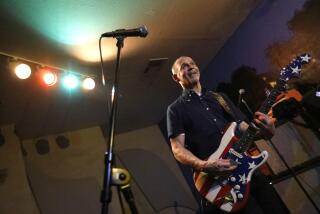MINUTEMEN REBORN
- Share via
Mike Watt and D. Boon met when they were 12. Boon, playing war, jumped out of a tree in a San Pedro park and landed on Watt. They spent their teens building models and playing guitars, then punk-rock came along and they found they could play in public. With George Hurley on drums, Watt on bass and Boon on guitar, they became the Minutemen, one of the most musically daring and politically acute bands in America. Then last December D. Boon was killed in an auto accident in Arizona.
That’s how the Minutemen might have told the story--no frills, no wasted motion. For a long time the Minutemen refused to play guitar solos or write choruses into their songs, which all clocked in at under 60 seconds.
The Minutemen were established as more than just a hot band. They were moral/spiritual leaders in the American musical underground. Their last album, “Three Way Tie (for Last)” had just come out and was earning more raves when Boon died.
That might have been it for the knotty, exhilarating, jazz-funk-punk-folk hybrid devised by the Minutemen. But six months later, Watt and Hurley were back in action. They took in a 21-year-old singer-guitarist from Ohio named Ed Crawford who’d never played a professional gig, called themselves Firehose and started spinning out that intense, jagged sound all over again.
No one was more surprised about it than Mike Watt.
“I didn’t want to do anything,” he said of the period following Boon’s death. “I didn’t want to play anymore. No bass, no guitar, nothin’.”
Sitting in a Hollywood delicatessen down the street from Club Lingerie, where Firehose would play in a couple of hours, Watt seemed both edgy and agitated--a combination of nervousness about the show and stubborn emotions about his longtime friend Boon.
“See, I relied on him emotionally,” Watt said of the burly singer-guitarist. “When we played, see, I’d look at him. It’s hard for me. . . . I used to look over there and I thought if he was up there anybody could be up there.
“He’d wear like eight layers of clothes sometimes, jumping around like that. He was inspiring, I got to tell you. . . . I didn’t really need inspiration. He was the reason I played.”
Watt says the weeks after Boon’s death were “the worst time of my life.” He couldn’t even bring himself to go to the funeral.
“He’s buried across the street from the Navy housing in Pedro where I grew up,” Watt said. “There’s this tunnel that went across Western Avenue. We used to run on those graves! I wouldn’t go (to the funeral). Couldn’t.”
Watt stayed in his apartment, avoiding the phone calls from musicians trying to get something going with him. He credits Kira, former bassist with Black Flag, with finally getting him playing again. Calling themselves Dos, they wrote some songs and did a little recording.
Then Watt got calls from Crawford in Ohio saying he wanted to try out for him. Next thing, Watt said, Crawford “calls up and says, ‘Look, man, I’m in town, just let me play for you.’ And he comes over. Me and D. Boon loved the Who, and he played ‘I’m the One’ from ‘Quadrophenia.’ And he knew all our tunes, stumblin’ through ‘em--I mean, D. Boon thought of things dudes couldn’t copy.
“Boon fired him in a way. Boon left something and it’s in him. I just thought, ‘Man, you know, he left this guy, this kind of hankerin’, burnin’, and I’ve got to try, too.
“And then I called George, and he’s so happy. He said, ‘I’ve been waitin’ for you.’ ”
Firehose did its first show in June and has been picking up the pace--”It’s the only way to learn,” said Watt, who brings the trio to McCabe’s on Friday on a bill with poets Michael McClure and Michael C. Ford.
Watt, who plans to release at least one live album of the Minutemen, expects Firehose to record an album in October for SST Records. And while he’s pleased with the way the new band has developed so far, there’s one thing that’s been eating at him.
“Everybody wants to hear the song I’m gonna write for D. I can’t write it. . . . Somehow it’ll come to me though.”
More to Read
The biggest entertainment stories
Get our big stories about Hollywood, film, television, music, arts, culture and more right in your inbox as soon as they publish.
You may occasionally receive promotional content from the Los Angeles Times.








